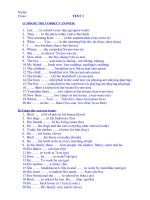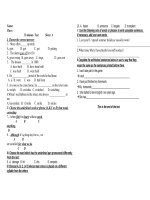Bai tap tieng anh 8
Bạn đang xem bản rút gọn của tài liệu. Xem và tải ngay bản đầy đủ của tài liệu tại đây (101.6 KB, 4 trang )
MỤC LỤC
UNIT 1: MY FRIEND
UNIT 2: MAKING ARRANGEMENTS
UNIT 3: AT HOME
UNIT 4: OUR PAST
UNIT 5: STUDY HABITS
UNIT 6: THE YOUNG PIONEERS CLUB
UNIT 7: MY NEIGHBORHOOD
UNIT 8: COUNTRY LIFE AND CITY LIFE
Trang 2
Trang 12
Trang 20
Trang 30
Trang 40
Trang 50
Trang 60
Trang 70
UNIT 1: MY FRIEND
I. LISTEN AND READ
1. to seem (v)
2. to receive (v)
3. next-door (adj)
: có vẻ, dường như
-» next door (adv): trong, bên trong nhà
: nhận
/ phòng bên cạnh
: ngay bên cạnh, kế
4. smile (n)
: nụ cười
bên (nhà, văn phòng) -» to smile (at sb / sth): mỉm cười
II. SPEAK
5. blond (adj)
: (tóc) vàng hoe
9. bald (adj)
: hói, trụi
6. slim (adj)
: mảnh mai, thon
10. dark (adj)
: (màu sắc) thẫm, sẫm
7. straight (adj)
: thẳng
11. fair (adj)
: (da) trắng, (tóc) vàng hoe
8. curly (adj); quăn, xoắn
12. brown (adj)
: màu nâu
III. READ
13. lucky (adj)
: may mắn ≠ unlucky 19. orphanage (n) : trại mồ côi
-» luckily (adv) : may mắn
-» orphan (n) : trẻ mồ cơi
14. character (n)
: tính cách, cá tính
20. hard-working (adj): làm việc năng nổ
15. Sociable (adj) = outgoing (adj): dễ chan
và cần thận
hòa, dễ gần gũi, hòa đồng
21. grade (n)
: hạng, loại, điểm
≠ reserved (adj) : kín dáo, dè dặt
22. humor (n)
: tính hài hước, tính chất
16. extremely (adv) : rất, cực kỳ
vui, khôi hài
17. generous (adj) : rộng lượng, rộng rãi,
-» humorous (adj): có tính hài hước,
hào phóng
tính hài.
-» generosity (n) : sự rộng lượng
23. joke (n)
: chuyện dừa, lời nói đùa
18. volunteer (adj, v) : tình nguyện
-» tell a joke : nói đùa
-» volunteer (n) : người tình nguyện
IV. WRITE
24. rise - rose - risen (v): mọc (mặt trời, mặt 29. Mars (n)
: Sao Hỏa
trăng)
30. to annoy (v) : làm khó chịu, làm bực
25. to set (v)
: lặn
mình
26. planet (n)
: hành tinh
31. shy (adj)
: nhút nhát, rụt rè
27. Earth (n)
: trái đất
32. appearance (n)
: bề ngoài, diện mạo
28. Mercury (n)
: Sao Thủy
-» appear (v) : xuất hiện ≠ disappear (v)
V. LANGUAGE FOCUS
1. ATTRIBUTIVE and PREDICATIVE ADJECTIVES (Tính từ thuộc ngữ và tính từ vị ngữ)
a. Attributive adjectives (Tính từ thuộc ngữ)
- Là tính từ đứng trước danh từ để miêu tả cho danh từ đó
Ex: (1) The new secretary doesn’t like me.
(2) He is a rich businessman.
b. Predicative adjectives (Tính từ vị ngữ)
- Là tính từ theo sau động từ be, become get, seem, look, feel, sound, smell, taste, ...
Ex: (1) The baby is asleep.
(2) He looks afraid.
* NOTE: Phần lớn các tính từ đều có thể ở cả 2 vị trí thuộc ngữ lẫn vị ngữ trong câu.
Ex: (1) He became famous for his fairy tales.
(2) Julia Roberts is an American famous actress.
2. ENOUGH... TO... (đủ ...để có thể)
S + be (+ not) + ADJ + ENOUGH + (for O) + to V.
S (+ not) + V + ADV + ENOUGH + (for O) + to V
S (+ not) + V + ENOUGH + NOUN(s) + (for O) + to V.
Ex: (1) She is old. She can do what she wants. (enough)
-» She is old enough to do what she wants.
(2) It is cold. We should wear heavy jacket.
-».............................................................................................................................................
(3) He ran fast. He won the first prize.
-».............................................................................................................................................
(4) That car is too expensive. I canh buy it. (enough)
-» I don‘t..................................................................................................................................
3. ADJECTIVE ORDER (Trật tự tính từ)
GROUP
1. Determiners
2. Cardinal adjective
3. Opinion
4. Size
5. Quality
6. Age
7. Shape
8. Color
9. Origin
10. Material
11. Purpose
EXAMPLE
a, the, this, my, some, several, ...
one, four, ten, ...
lovely, nice, wonderful, great, terrible, ...
long, short, tall, big, small, enormous, fat, ...
quiet, boring, important, famous, sunny, warm, fast, wise,
...
new, old, young, elderly, ...
round, oval, square, ...
red, blue, green, ...
Vietnamese, Chinese, American, ...
stone, plastic, steel, paper, leather, ...
bread, beer, flower, coffee, ...
Ex: (1) Một cái bàn cà phê làm bằng gỗ màu nâu mới.
-» ............................................................................................................................................
(2) Ba váy đầm dài lớn màu đỏ rất dễ thương.
-» ............................................................................................................................................
(3) Một bình hoa nhỏ bằng nhựa từ Ý của anh ấy.
-» ............................................................................................................................................
* NOTE:
- Tính từ chỉ kích thước và chiều dài thường đứng trước tính từ chỉ hình dáng và chiều rộng.
Ex: (1) She is a tall thin girl.
(2) It is a long narrow street.
- Tính từ chỉ thứ tự đứng trước tính từ chỉ số lượng.
Ex: I stayed in Hanoi for the first two days.
- Nếu tính từ cùng loại, thì tính từ ngắn thường đặt trước tính từ dài.
Ex: It is a cold windy day.
- Khi có 2 hay hơn 2 tính từ chỉ màu sác, ta dùng liên từ “and”.
Ex: (1) a black and white dress.
(2) a red, white and green flag.
--------------------------------------------------------
EXERCISE
I. Combine each of the following pairs of sentences into one sentence.
Use ADXECTTVE + ENOUGH + TO INFINITIVE.
1. My sister is old. She can drive a car.
.....................................................................................................................................................
2. She is beautiful and intelligent. She can become Miss World.
.....................................................................................................................................................
3. The weather was fine. We could go camping.
.....................................................................................................................................................
4. The worker is clever. He can make fine things from wood.
.....................................................................................................................................................
5. They are rich. They can buy that expensive house.
.....................................................................................................................................................
6. He worked hard. He could pass the examination.
.....................................................................................................................................................
7. They are tall. They can reach the shelves.
.....................................................................................................................................................
8. The test is easy. He can get ten points.
.....................................................................................................................................................
II. Combine each of the following pairs of sentences into one sentence.
Use NOT + ADJECTIVE + ENOUGH (FOR S.O) + TO INFINITIVE.
1. The radio isn’t small. You can’t put it in your pocket.
.....................................................................................................................................................
2. The coat isn’t warm. I don’t wear it in winter.
.....................................................................................................................................................
3. Those apples aren’t ripe. We can’t eat them.
.....................................................................................................................................................
4. Mr. Robinson isn’t rich. He can’t buy this house.
.....................................................................................................................................................
5. The little boy is not strong. He cannot lift this suitcase.
.....................................................................................................................................................
6. Mr. Smith didn’t feel well. He can’t go to work this morning.
.....................................................................................................................................................
7. The piano is not light. He can’t move it.
.....................................................................................................................................................
8. The water isn’t safe. We can’t drink it.
.....................................................................................................................................................
III. Combine each of the following pairs of sentences into one sentence.
Use NOT + ADJECTIVE + ENOUGH (FOR S.O) + TO INFTNITIVE.
1. She is too young. She can’t get married.
.....................................................................................................................................................
2. That table is too heavy. The porter can’t move it.
.....................................................................................................................................................
3. Jimmy is very stupid. He can’t understand what his father said.
.....................................................................................................................................................
4. The mountain is very high. We can’t climb it.
.....................................................................................................................................................
5. This dress is very old. I can’t wear it any more.
.....................................................................................................................................................
6. The sound is very soft. We can’t hear it.
.....................................................................................................................................................
7. This grammar point is very difficult. The children can’t understand.
.....................................................................................................................................................
8. It was very cold yesterday. We couldn’t go out.
.....................................................................................................................................................
IV. Combine each of the following pairs of sentences into One sentence.
Use NOT +ENOUGH + NOUN (FOR S.O) + TO INFINITIVE.
1. There weren’t any chairs. Everyone can’t sit down.
.....................................................................................................................................................
2. Nam didn’t finish the exam. He didn’t have much time.
.....................................................................................................................................................
3. I don’t have much money. However I’d like to go on holiday.
.....................................................................................................................................................
4. She couldn’t make coffee for everyone. There weren’t any cups.
.....................................................................................................................................................
5. He doesn’t have experience. They don’t offer that job to him.
.....................................................................................................................................................
V. Arrange the adjectives in bracket in the correct order.
1. It is a (wooden / round) table.
.....................................................................................................................................................
2. She is wearing a (green / new / beautiful) dress.
https://giaidethi24h .net









